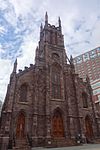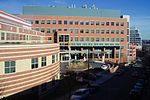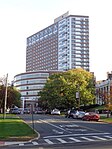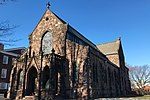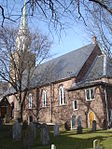New Brunswick station
Amtrak stations in New JerseyBuildings and structures in New Brunswick, New JerseyFormer Pennsylvania Railroad stationsNJ Transit Rail Operations stationsNational Register of Historic Places in Middlesex County, New Jersey ... and 7 more
New Jersey Register of Historic PlacesRailway stations in Middlesex County, New JerseyRailway stations in New Jersey at university and college campusesRailway stations in the United States opened in 1838Railway stations on the National Register of Historic Places in New JerseyStations on the Northeast CorridorUse mdy dates from February 2019

New Brunswick station is a railroad station in New Brunswick, New Jersey. It serves Amtrak and NJ Transit trains on the Northeast Corridor. The station is located at the intersection of Easton Avenue and French and Albany Streets, near the College Avenue Campus of Rutgers University. The station has two high-level side platforms serving the outer tracks of the four-track Northeast Corridor. Most of Amtrak's Northeast Corridor services bypass the station via the inner tracks, except for select Keystone Service and Northeast Regional trains and the weekday westbound Palmetto. Northbound Crescent trains stop in New Brunswick as well.
Excerpt from the Wikipedia article New Brunswick station (License: CC BY-SA 3.0, Authors, Images).New Brunswick station
Easton Avenue, New Brunswick
Geographical coordinates (GPS) Address Nearby Places Show on map
Geographical coordinates (GPS)
| Latitude | Longitude |
|---|---|
| N 40.496388888889 ° | E -74.446388888889 ° |
Address
Easton Avenue
Easton Avenue
08901 New Brunswick
New Jersey, United States
Open on Google Maps
